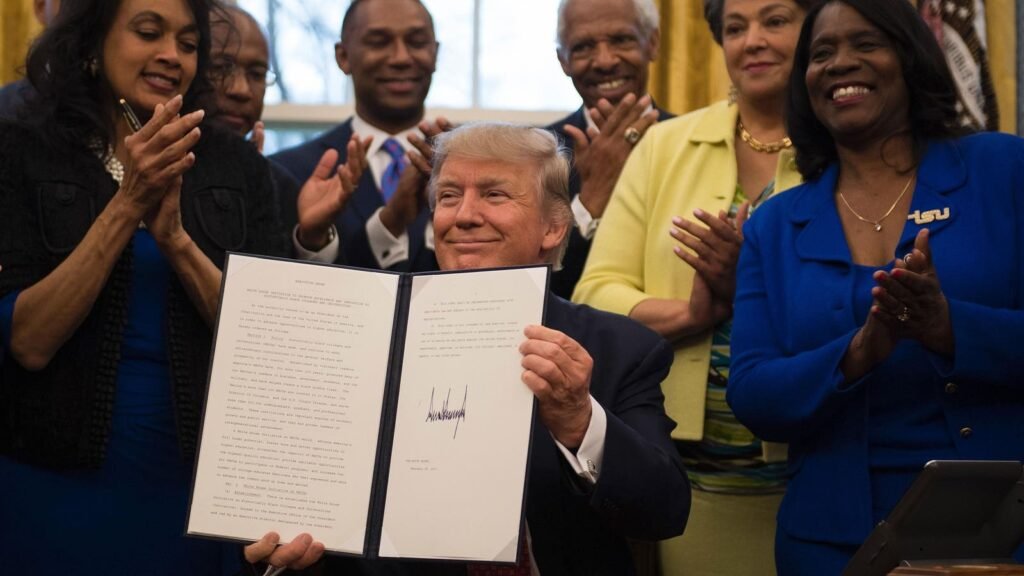The education technology sector is facing unprecedented transformation driven by two powerful forces: the rapid advancement of artificial intelligence and the return of Trump-era education policies. These dual disruptions are forcing companies to radically rethink their business models and market approaches.
AI’s Revolutionary Impact on Education
(Photo by Joe Raedle/Getty Images)
Artificial intelligence is fundamentally reshaping how education is delivered and consumed. Traditional educational models are being upended by AI-powered tools that can provide instant tutoring, grade assignments, and create personalized learning paths. The technology is capable of analyzing student performance in real-time, adapting content difficulty, and providing immediate feedback – functions that traditionally required human intervention.
This AI revolution has created both opportunities and existential threats for established ed-tech companies. Those slow to adapt find themselves competing with free or low-cost AI alternatives that can match or exceed their core services. The technology is particularly disruptive in areas like homework help, language learning, and personalized tutoring – traditionally profitable segments for ed-tech companies.
Trump’s Education Vision: A Return to State Control
The return of Trump-era education policies, marked by the nomination of Linda McMahon as education secretary, signals a dramatic shift in federal education oversight. Trump’s stated intention to “send Education BACK TO THE STATES” represents a fundamental restructuring of how education is governed and funded in America.
McMahon, the former WWE CEO and Small Business Administration leader, would likely oversee significant reductions in federal education spending and a massive decentralization of education control. This shift would give states unprecedented authority over curriculum choices, testing requirements, and educational standards – a change that could create a more fragmented but potentially more innovative education market.
Three Key Examples of the Dual Disruption
The transformation in education technology is exemplified by three major players adapting to these changes in distinct ways. Chegg (NYSE: CHGG), once a dominant player in digital tutoring, is down over 74% year to date, as AI tools like ChatGPT offer instant homework help for free, though the company has recently announced plans to integrate AI into its platform to create more personalized study experiences and enhanced tutoring capabilities. Duolingo (NYSE: DUOL) up over 65% year to date, represents successful adaptation through its embrace of AI for enhanced speech recognition and personalized learning, with its recent launch of role-playing AI characters pushing the boundaries of interactive language learning, while maintaining a flexible structure that can adapt to varying state requirements.
Elevo, a privately-held California company led by founder and CEO Chris Murphy, offers K-12 programs supporting students’ physical, mental, and academic well-being. The company exemplifies innovative AI integration, using the technology to optimize recruitment by identifying top-performing coaches and enhancing customer success operations through AI-powered note-taking and reporting systems during school visits. As a private company, Elevo’s nimble response to policy changes and AI-driven operations positions them well for scaling in a decentralized education landscape.
Market Implications and Future Outlook
The combination of AI advancement and policy shifts is creating winners and losers in the ed-tech sector. Companies that can navigate both technological disruption and regulatory changes while maintaining educational quality will likely emerge as leaders.
For investors, the key metrics to watch have shifted. Success in this new landscape requires:
· Robust AI integration capabilities
· Flexible platforms that can adapt to state-specific requirements
· Strong relationships with state-level education authorities
· Ability to differentiate from free AI alternatives
The education technology sector appears to be entering a period of significant consolidation and transformation. Companies that successfully adapt to both AI capabilities and a more state-centric regulatory environment will likely shape the future of learning. Those that fail to adapt risk becoming obsolete in an increasingly competitive and fragmented market.
For education technology companies, the path forward requires careful balancing of innovation and compliance. The successful integration of AI capabilities must be matched with the ability to navigate an increasingly complex regulatory landscape where state-level relationships may become as important as technological capabilities.
These dual disruptions signal not just a change in how education is delivered, but a fundamental shift in who controls and shapes educational content in America. The companies that survive and thrive will be those that can turn these challenges into opportunities for innovation and growth.




